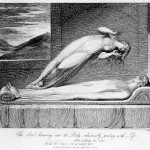
(Wikimedia Commons public domain)
For years, I strongly disliked air travel. Now, though, I rather like it. I cherish the uninterrupted hours that it gives me for reading and for catching up on films that I’ve wanted to see.
Yesterday, I read Dallas Willard and Brandon Rickabaugh, “Intentionality contra Physicalism: On the Mind’s Independence from the Body,” Philosophia Christi 20/2 (2018): 497-516. The late Professor Willard taught in the Department of Philosophy at the University of Southern California; Brandon Rickabaugh teaches in the Department of Philosophy at Baylor University.
Herewith, I enter some notes from that reading for my own future use and your potential interest.
Willard and Rickabaugh begin by acknowledging the derision in which some hold the position that mind and brain are distinct. Two authors, for instance, describe belief in dualism as “akin to explaining lightning in terms of Thor’s anger” and as “fundamentally primitive and pre-scientific” (497). Another writer compares dualism to belief in elves and chupacabras (498). (I can already safely predict that one of the atheists who regularly comment on this blog will resonate with these dismissive remarks. The comparison to “Thor’s anger” is precisely the kind of rhetorical trope in which he likes to indulge.)
However, they say, “Even those who reject mind-body independence have argued that the standard reasons for doing so are both exaggerated and ultimately fail” (498). As examples, they cite William Lycan, “Giving Dualism Its Due,” Australasian Journal of Philosophy 87 (2009): 551-556; and José Gusmão Rodriques, “There Are No Good Objections to Substance Dualism,” Philosophy 89 (2014): 199-222.
“Our main thesis . . . is that the ontological nature of intentionality is compelling evidence against physicalism” (499).
It’s a fairly technical and/or demanding argument, which I won’t attempt to summarize here. Those interested should read the article itself. But I’ll pick up some other things here and in the sequel:
They cite what Joseph Levine calls “the explanatory gap: our inability to provide or even comprehend a plausible explanation of how consciousness could depend upon a physical nonconscious substrate. . . . Attempts at such an explanation constitute what David Chalmers calls ‘the hard problem of consciousness.’ As of late, most think the hard problem is unsolvable, leaving the explanatory gap unresolved. Ned Block and Robert Stalnaker observe, ‘No one has ever given an account, even a highly speculative, hypothetical, and incomplete account, of how a physical thing could have phenomenal states.” (504)
Posted from Richmond, Virginia
















